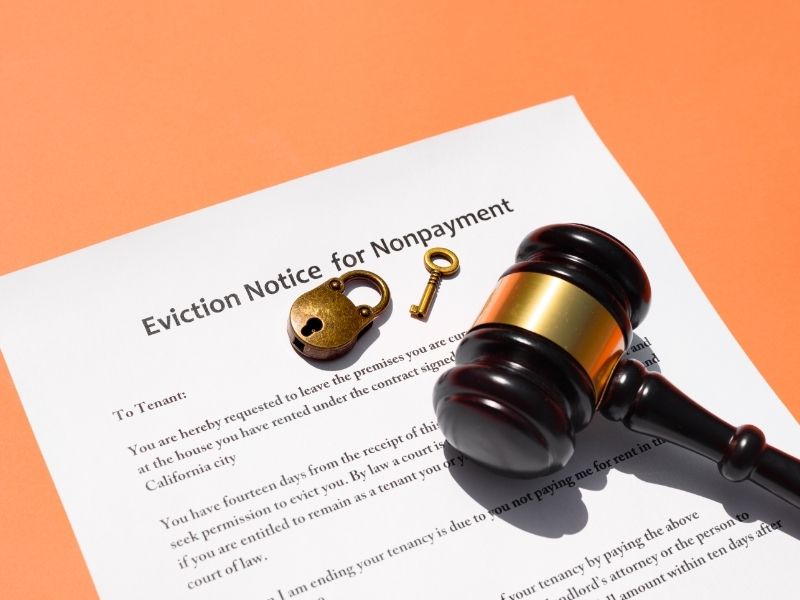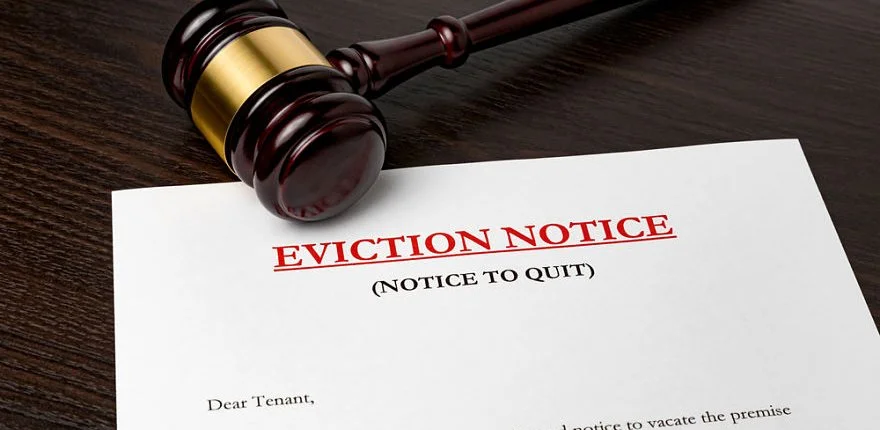Navigating the eviction process in New Hampshire can be complex, especially with recent legislative updates in 2025. Whether you're removing a tenant for nonpayment, lease violations, or the end of a rental term, it’s crucial to follow proper legal procedures. This guide by LeaseRunner breaks down everything landlords need to know, from notice requirements to court steps, costs, and common mistakes to avoid.
Recent Development That Will Impact Eviction Laws in New Hampshire (2025)
New legislative activity in 2025 is reshaping the eviction process in New Hampshire, with two key bills that landlords need to understand: HB 60, which affects lease expiration rights, and HB 457, concerning zoning restrictions on dwelling units.
New Hampshire's eviction laws are subject to change, and two recently enacted bills are set to have a direct impact

HB 60: Expiration of Lease Term as "Good Cause" for Eviction
Status: Enacted in July 2025, with an effective date of July 2026.
Previously, under a 2005 New Hampshire Supreme Court ruling, the expiration of a lease term alone was not considered sufficient "good cause" to evict a tenant from a restricted property.
HB 60 provides a new legal avenue for landlords. For residential leases with an original term of 12 months or longer, or for leases renewed for a total of 12 months or more, the expiration of the lease term now constitutes "good cause" for eviction. To use this provision, a landlord must:
- Provide the tenant with a written notice at least 60 days before the lease's termination date.
- File a possessory action within six months of the lease expiring.
- “No-fault termination of tenancy" is not considered the eviction for tenant screening purposes if it's not due to the tenant's actions.
HB 457: Relative to Zoning Restrictions on Dwelling Units
Status: Enacted in July 2025, with an effective date of September 13, 2025.
While not directly about the eviction process itself, this bill impacts a landlord's ability to rent to certain groups and could affect future lease provisions and potential lease violation disputes. HB 457 prohibits municipalities from passing or enforcing zoning ordinances that:
- Restrict the number of occupants in a dwelling unit to fewer than two people per bedroom.
- Discriminate based on the familial or non-familial relationships or marital status of the occupants.
This bill aims to increase housing availability and directly challenges local ordinances in towns with high populations of college students or unrelated housemates.
For landlords, this means you can no longer be limited by a local zoning ordinance that dictates, for example, that no more than three unrelated individuals can live together. Your tenant can legally have more occupants, provided they do not violate other safety codes or the number of people per bedroom rule.
This is a critical point to consider when drafting or updating your lease agreements and addressing potential occupancy issues.
Legal Reasons for Evicting a Tenant in New Hampshire
Under New Hampshire eviction laws, a landlord must have a legally valid reason to begin the eviction process in New Hampshire. Attempting to evict a tenant without one of these causes can lead to the dismissal of your case and expose you to liability.

Landlords in New Hampshire must have a legally supported reason, or "good cause," to evict a tenant
Nonpayment of Rent
When a tenant fails to make timely rent payments, the landlord may serve a 7-day notice to quit. If payment isn’t made within that period, the landlord can proceed with court filings. Landlords must maintain accurate rent records to support the legal procedures and protect their rights during judgment hearings.
Lease Violation
A lease violation refers to any breach of the rental agreement. It includes unauthorized pets, property damage that goes beyond normal wear and tear, illegal activity, or subletting without approval. In these cases, landlords must give tenants a 30-day notice to quit, specifying the breach and allowing time for correction (if applicable).
End of Lease Term
Thanks to new legislation in 2025 (HB 60), the expiration of a lease—specifically one with a term of 12 months or more—is now recognized as a valid cause for eviction. This change simplifies the process for landlords who choose not to renew leases. A 60-day written notice is required before pursuing legal action.
Read more: New Hampshire: Landlord Guide to Legal Rights, Eviction & Removal
Illegal or Criminal Activity
Landlords can initiate eviction if the tenant is involved in illegal drug use, violence, or other criminal conduct on or near the rental property. These are treated as serious offenses and typically allow for faster court procedures. To succeed in court, landlords must provide clear documentation or police reports to support the unlawful detainer claim.
Landlords can reduce this risk by checking an eviction history before signing a lease, helping to identify those with a history of prior evictions.
Serving an Eviction Notice in New Hampshire
Serving the eviction notice correctly is a crucial step in the eviction process in New Hampshire. Landlords must follow strict rules under state eviction laws to ensure the notice is legally valid and enforceable.

Serving an eviction notice is the formal first step in the eviction process in New Hampshire
Choosing the Right Type of Notice
The type of notice a landlord must serve depends on the reason for eviction. Common notice types include:
- 7-Day Notice to Quit – Used when a tenant has failed to make a rent payment.
- 30-Day Notice to Quit – Typically applies in cases of lease violation, such as property damage or unauthorized occupants.
- 60-Day Notice to Quit – Required when the eviction is based on the expiration of a fixed-term lease, particularly following the updates from HB 60.
Proper Delivery Methods
New Hampshire legal procedures require eviction notices to be delivered through acceptable means. The most common methods include:
- Personal delivery to the tenant
Certified mail with return receipt requested - Leaving the notice at the rental unit if personal service isn’t possible
It's best practice for landlords to document the date and method of delivery, as this information may be required during court procedures or in case of a dispute over notice timing.
Notice Must Include
To be legally valid, your eviction notice must contain specific information. Failure to include these details can invalidate your notice. The notice must:
- Be in writing.
- State the specific, legal reason for the eviction.
- Clearly state the date on which the tenancy will terminate.
- For nonpayment of rent, specify the amount of rent due and inform the tenant of their right to cure by paying the back rent.
- Include the landlord's name and contact information.
Step-by-Step Eviction Process in New Hampshire
Following the correct eviction process in New Hampshire is non-negotiable for landlords. Any misstep in these legal procedures can result in a case being dismissed, forcing you to start over.
Step 1: Serve a Notice to Quit
The notice must be in writing and served properly, as described in the previous section. The notice must match the reason for eviction. This notice gives the tenant a final opportunity to resolve the issue or vacate the rental property.
Step 2: File a Landlord and Tenant Writ
If the tenant does not comply with the notice by the specified deadline, the landlord must file a "Landlord and Tenant Writ" with the Circuit Court - District Division in the county where the property is located. This document formally initiates the unlawful detainer lawsuit. You will need to submit a copy of the original Notice to Quit and a fee to the court.
Step 3: The Court Serves the Tenant
After you file the writ, the court arranges for an official to serve the tenant with the summons and a copy of your complaint. This is typically done by a sheriff or process server. The summons notifies the tenant that a lawsuit has been filed against them and provides them with a "return day"—a deadline by which they must file an Appearance Form with the court if they wish to contest the eviction.
Step 4: Tenant May Respond or Attend the Hearing
The tenant has a seven-day window from the date they are served to file a formal Appearance Form with the court. This is their opportunity to defend against the eviction. If the tenant files an Appearance Form, the court will schedule a hearing, typically within 10 days of the filing. If the tenant fails to file this form, they will be defaulted, and the court will likely rule in the landlord's favor without a hearing.
Step 5 – Judgment and Writ of Possession
If the court rules in favor of the landlord, it issues a judgment for possession. The tenant typically has five days to vacate the rental property voluntarily. If they don’t leave within that time, the court will issue a Writ of Possession, authorizing the sheriff to proceed with removal.
Step 6 – Sheriff Executes the Eviction
The final step involves the sheriff enforcing the Writ of Possession. The sheriff arrives at the property, ensures the tenant vacates, and returns possession of the unit to the landlord. At no point should landlords attempt to evict tenants on their own, as doing so may violate tenant protections and result in legal penalties.
Timeline and Cost of Eviction in New Hampshire

Navigating the financial and time commitments of the eviction process in New Hampshire is essential for any landlord. While every case is unique, the table below provides a general overview of the typical timeline and costs you can expect.
Understanding both the timing and financial impact of each step in the eviction process in New Hampshire is essential
Required Documents for Eviction Proceedings
A successful eviction process in New Hampshire hinges on meticulous documentation. Without the correct paperwork, a landlord's case can be easily dismissed, regardless of the merits.
1. The Lease or Rental Agreement
It legally establishes the landlord-tenant relationship and outlines the terms that may have been violated. A landlord should always have a complete and signed copy of the lease agreement. If there have been any amendments or addenda, those must be included as well.
2. The Notice to Quit
You will need to provide a copy of this notice to the court, along with proof of service. This could be an "Affidavit of Service," a form where you attest to how and when the notice was delivered. The notice itself must be accurate and state the specific legal reason for the eviction.
3. Court Filing Receipt and Related Forms
After submitting the writ, keep copies of:
- The stamped filing receipt
- Any scheduling notices or hearing dates
- The Writ of Possession (if judgment is granted)
These documents track the progress of the eviction process in New Hampshire and will be needed for enforcement.
4. Evidence of the Lease Violation
Depending on the reason for eviction, you must have corresponding evidence. For nonpayment of rent, this would include a ledger showing the dates rent was due, payments received, and the outstanding balance. For a lease violation, this could be photographs, written correspondence (emails or texts), witness statements, or police reports.
5. Rent Ledger or Payment Records
If the eviction is for nonpayment of rent, you’ll need a full rent ledger showing all payments received and missed. Accurate financial records can make or break a landlord’s case in court.
Landlord Mistakes to Avoid in New Hampshire Evictions
Even a small error during the eviction process in New Hampshire can cost landlords time, money, or the entire case. Below are common mistakes to avoid when managing tenant evictions.

Landlords should be aware of these common pitfalls and take steps to avoid them
1. Serving the Wrong Type of Notice
Different situations require different notices—such as a 7-Day Notice for nonpayment or a 30-Day Notice for lease violations. Using the wrong notice, or failing to include essential details like the reason and deadline, can make the notice invalid in court.
2. Not Waiting the Full Notice Period
Landlords must wait the legally required amount of time after serving a notice before filing in court. Filing too early—even by one day—can result in the case being dismissed and restarted from scratch.
3. Poor Recordkeeping or Missing Documents
Eviction cases are often won or lost based on documentation. A landlord who lacks a copy of the signed lease, a rent ledger showing missed payments, or evidence of a lease violation will have a weak case.
4. Attempting a "Self-Help" Eviction
Changing the locks, shutting off utilities, or intimidating the tenant are all illegal under New Hampshire landlord-tenant law. Only law enforcement can carry out a legal removal. These actions can lead to lawsuits and liability for the landlord.
Besides, entering the rental without notice—even for valid reasons—can lead to harassment claims or lease termination defenses. Always follow New Hampshire’s entry rules, which are clearly outlined in this guide on whether a landlord can enter without permission.
5. Ignoring Tenant Defenses or Legal Aid Involvement
Tenants may assert defenses based on improper procedure, discrimination, or retaliation. If a tenant seeks legal aid or invokes tenant rights, the process could be delayed. Landlords must be ready to comply with court requirements and respond professionally to any claims.
6. Not Following the Full Legal Process
The eviction process in New Hampshire requires strict compliance with notice rules, filing procedures, and court appearances. Skipping steps or assuming verbal agreements are enforceable can put the entire eviction at risk.
7. Using "Self-Help" Evictions
In New Hampshire, it is illegal for landlords to use self-help methods to force a tenant out. This includes changing the locks, shutting off utilities, or removing the tenant's personal belongings. Not only will a court rule against you, but you could face significant financial penalties. The only legal way to remove a tenant is through a court-ordered sheriff's eviction.
Conclusion
Learning the eviction process in New Hampshire requires attention to detail, legal compliance, and thorough documentation. Whether you're dealing with nonpayment, lease violations, or the end of a rental agreement, each step must follow strict procedures.
Understanding your responsibilities—and your tenants' rights—helps maintain professionalism while protecting your property. When in doubt, consulting an attorney or using services like LeaseRunner can simplify your workflow and reduce risk.
FAQs
1. How long does it take to evict a tenant in New Hampshire?
The eviction process generally takes 3 to 6 weeks, depending on the reason for eviction, court scheduling, and whether the tenant contests the case.
2. Do I need a lawyer to evict a tenant in New Hampshire?
No, but it's often recommended—especially if the tenant files a legal defense or if the case involves complicated lease terms or potential violations of tenant protections.
3. Can I evict a tenant for no reason in New Hampshire?
Only at the end of a lease term or if the tenancy is month-to-month. Even then, proper notice is required. With the passage of HB 60, lease expiration is now considered good cause for eviction.
4. What if the tenant refuses to leave after I win the case?
You must request a Writ of Possession, and a sheriff will carry out the eviction. Landlords are not allowed to remove tenants themselves.
5. How much does it cost to evict someone in New Hampshire?
The cost can range from around $205 – $835+ or more, not including lost rental income. Costs include court filing fees, service fees, and potentially attorney fees if you choose to hire legal representation.



